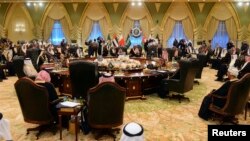KUWAIT —
Gulf Arab states expressed concern at a summit on Wednesday over Iran's plans to build more atomic power plants, while welcoming a nuclear deal it struck with six world powers last month.
Iranian media have said Tehran is in serious talks with Russia to construct new nuclear power stations, based on a 1992 agreement with Moscow.
Abdullatif al-Zayani, Secretary-General of the Gulf Cooperation Council (GCC), said after the two-day summit in Kuwait: “The council expressed concern regarding announcements over plans to build more nuclear reactors on the banks of the Gulf that threaten the environmental system and water security.”
The Gulf states, especially Sunni Muslim Saudi Arabia, the regional heavyweight, see Shi'ite Iran as their chief rival but have cautiously welcomed its Nov. 24 interim accord with world powers.
The deal requires Tehran to suspend enrichment of uranium beyond the level needed for use in power stations, in return for an easing of international sanctions. The Gulf states see it as a step towards curbing what they fear is a secret Iranian program to develop nuclear weapons, a charge Tehran denies.
Reading from the final communique of the meeting, Zayani also said the GCC welcomed what he described as a new direction in leadership under Iranian President Hassan Rouhani.
Iranian Foreign Minister Mohammad Javad Zarif has visited Kuwait, Qatar, Oman and the UAE in a tour aimed at easing Gulf Arab concern about a potential resurgence in Tehran's influence as a result of the nuclear accord. The other GCC members are Saudi Arabia and Bahrain.
Zayani said the GCC stressed the importance of the “accurate and complete implementation of this deal” under the supervision of the U.N. nuclear watchdog.
Iranian media have said Tehran is in serious talks with Russia to construct new nuclear power stations, based on a 1992 agreement with Moscow.
Abdullatif al-Zayani, Secretary-General of the Gulf Cooperation Council (GCC), said after the two-day summit in Kuwait: “The council expressed concern regarding announcements over plans to build more nuclear reactors on the banks of the Gulf that threaten the environmental system and water security.”
The Gulf states, especially Sunni Muslim Saudi Arabia, the regional heavyweight, see Shi'ite Iran as their chief rival but have cautiously welcomed its Nov. 24 interim accord with world powers.
The deal requires Tehran to suspend enrichment of uranium beyond the level needed for use in power stations, in return for an easing of international sanctions. The Gulf states see it as a step towards curbing what they fear is a secret Iranian program to develop nuclear weapons, a charge Tehran denies.
Reading from the final communique of the meeting, Zayani also said the GCC welcomed what he described as a new direction in leadership under Iranian President Hassan Rouhani.
Iranian Foreign Minister Mohammad Javad Zarif has visited Kuwait, Qatar, Oman and the UAE in a tour aimed at easing Gulf Arab concern about a potential resurgence in Tehran's influence as a result of the nuclear accord. The other GCC members are Saudi Arabia and Bahrain.
Zayani said the GCC stressed the importance of the “accurate and complete implementation of this deal” under the supervision of the U.N. nuclear watchdog.





